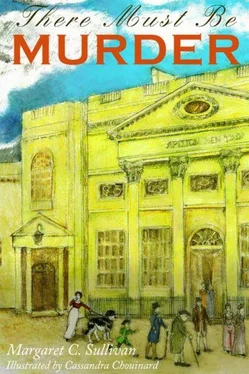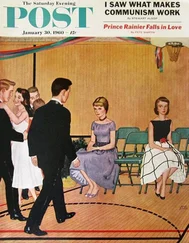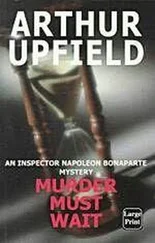Henry Tilney was rarely at a loss for words; but finding his father in the midst of a romance served to rob him of speech completely.
Chapter Five
Something Very Shocking Indeed
The ladies’ departure from Laura-place was delayed first by Miss Beauclerk’s “running up for a moment” to fetch her bonnet, pelisse, and parasol, a moment that turned into a quarter-hour, during which time the general and Henry left for Milsom-street.
They were further delayed by Lady Beauclerk’s insistence that her daughter’s maid accompany them, and her daughter’s insistence that they did not need such escort. “Mrs. Tilney and I will be one another’s chaperone, and MacGuffin here will provide us with more protection than Marie-Louise can.” The struggle of wills went on for several minutes whilst Catherine stood by, awkward at being forced to bear witness to it, but at last they made their escape.
By the time they reached Argyle-street, Catherine regretted her impulsive offer to accompany Miss Beauclerk. Miss Beauclerk floated along the pavement, everything about her as light as air, from the filmy lace that trimmed her pelisse to her delicate satin slippers. Catherine stumbled along, her thick leather shoes chosen with a mind to a country walk rather than to a city promenade, tethered to a living ten-stone weight that propelled her forward relentlessly and lurched off to either side whenever it smelled anything interesting.
As they crossed the bridge, Miss Beauclerk said, “Thank you for agreeing to be my companion, Mrs. Tilney. My maid reports all my movements to my mother. Not that there is anything to report, but it is a relief to feel oneself not constantly under the scrutiny of a servant with suspect loyalties. Now, what commissions have you? The linen-drapers, I dare say?”
“Truthfully, I have no commissions,” said Catherine. “I only said I did because Lady Beauclerk — ” she stopped, confused.
Miss Beauclerk laid a gloved hand on Catherine’s arm. “How very kind you are! I can see why Mr. Tilney is so wild about you; but you must not mind Mamma. She would very much like to talk to her friends about her daughter, Mrs. This or Lady That, but I have thwarted her. I am a regular old maid now, at seven and twenty, and she sometimes lets her disappointment get the better of her.”
“I do not see why you feel it so hopeless a case,” said Catherine. “Many girls marry who have not your advantages; you have a fortune, and you are very pretty.”
Miss Beauclerk looked at Catherine, startled, and then laughed. “Why, you dear creature! How funny you are. I dare say I could find a husband if I settled for the first fortune-hunter to make an offer; but I am, perhaps, too nice. We not all of us have a Henry Tilney in our sights.”
“Now that you are in Bath, I am sure you will meet someone. There are many young men here, and you had several partners at the assembly. But I dare say you have had seasons in Bath before, and even London.”
“There were no seasons in London for me, Mrs. Tilney! My father did not like cities, and disliked even more what he would have considered unnecessary expenditure. During his lifetime there were no trips to Bath, and certainly no houses taken in Laura-place. My mother is making up for a lifetime of deprivation.”
Such talk, so disrespectful of a father so lately dead, did not please Catherine, and she was silent. Miss Beauclerk did not seem to notice her disapproval, or at least was determined to ignore it. “Well, if you have no commissions, will you accompany me to the apothecary? I must have some of my special beauty tonic made up. The shop is a little out of the way, I am afraid.”
The apothecary’s shop was indeed out of the way, and Catherine was grateful for her canine escort as they entered a part of Bath she had never before seen. Close to the river, the buildings slouched and leaned upon one another, as did the individuals lounging in doorways and sauntering down the pavement. Some appeared as though they might approach the two ladies, and not with kind intentions, but a look from the shaggy Newfoundland kept them at a careful distance.
Catherine glanced at Miss Beauclerk, who appeared to take no notice of their singular surroundings. “There is a very good apothecary in Milsom-street,” she said. “Perhaps we could turn back, and you can obtain your potion there.”
“No,” said Miss Beauclerk, rather sharply. “It is a very particular kind of potion, and only can be trusted to someone who — oh, here it is.”
The apothecary’s premises turned out to be a dark little building at the end of a row of similarly mean-looking shops. Catherine did not feel right leaving MacGuffin on the pavement, at the mercy of passersby, so he accompanied them inside the shop and, at her command, sat by the door. Miss Beauclerk went to the counter whilst Catherine stopped to stroke the dog’s head and whisper, “I am sorry I brought you here, darling. We shall not be long.” He looked up at her trustingly, his feathery tail gently thumping the grimy floor.
As she turned away from MacGuffin, Catherine heard a man’s voice say, “Judith! What are you — ”
“Good day, Mr. Shaw,” said Miss Beauclerk, glancing consciously over her shoulder at Catherine.
The man to whom she spoke was extremely handsome — everything a hero should be: tall, dark, and mysterious; Valancourt verily come to life, though the practical part of Catherine’s mind could not help thinking that Emily would never have seen Valancourt in shirtsleeves and a green baize apron. But even Valancourt could not have gazed at his heroine with more obvious adoration than Mr. Shaw; his expression was one of mingled surprise, admiration, and something else — something hungry, thought Catherine, and then laughed at herself for being fanciful.
The man struggled for speech. “You are — you are in Bath?”
“Yes, my mother is here to take the waters, and how lucky that I was able to find your shop, since I have run out of the beauty tonic that you so obligingly made up for me.” She turned to Catherine. “Mrs. Tilney, may I present Mr. Shaw? He is a very clever apothecary — too much so for Beaumont, where he used to reside, and he has moved his practice to Bath, which I’m sure you will agree is just the place for an apothecary. He was invaluable during my father’s illness; poor Papa was in so much pain at the end, we were grateful for anything that would bring him relief, and Mr. Shaw’s potions always did so.”
“I was happy to be of service to you, Miss Beauclerk,” said Mr. Shaw. “And to your family, of course.”
“Of course,” said Miss Beauclerk with a smile, which Mr. Shaw returned; he stood staring at her for a moment, quite dazzled, until Miss Beauclerk reminded him gently, “My potion?”
“Yes! Yes, of course; right away; it will not take a moment to mix it up. Will you wait, or can I have it sent to — ?” The end of his sentence trailed off suggestively.
“We have taken a house in Laura-place,” said Miss Beauclerk. “But today, I shall wait.”
Mr. Shaw went into the back of the shop, and Miss Beauclerk said in a low voice. “Mr. Shaw comes from a very good family, really; but he must make his living. Younger son, you know.”
“Yes,” said Catherine. “Henry is a younger son.”
“So he is,” said Miss Beauclerk, smiling at her.
Just then a voice came from the back; not Mr. Shaw’s, but one of much more vulgar accents. “What do you need that for, then?”
A low murmuring followed; and the voice said, “What? You make that up for a young lady? What are you thinking, you fool?” More murmuring; and the voice said, “She’s right here in the shop? I’ll talk to her, you never mind.”
Читать дальше












